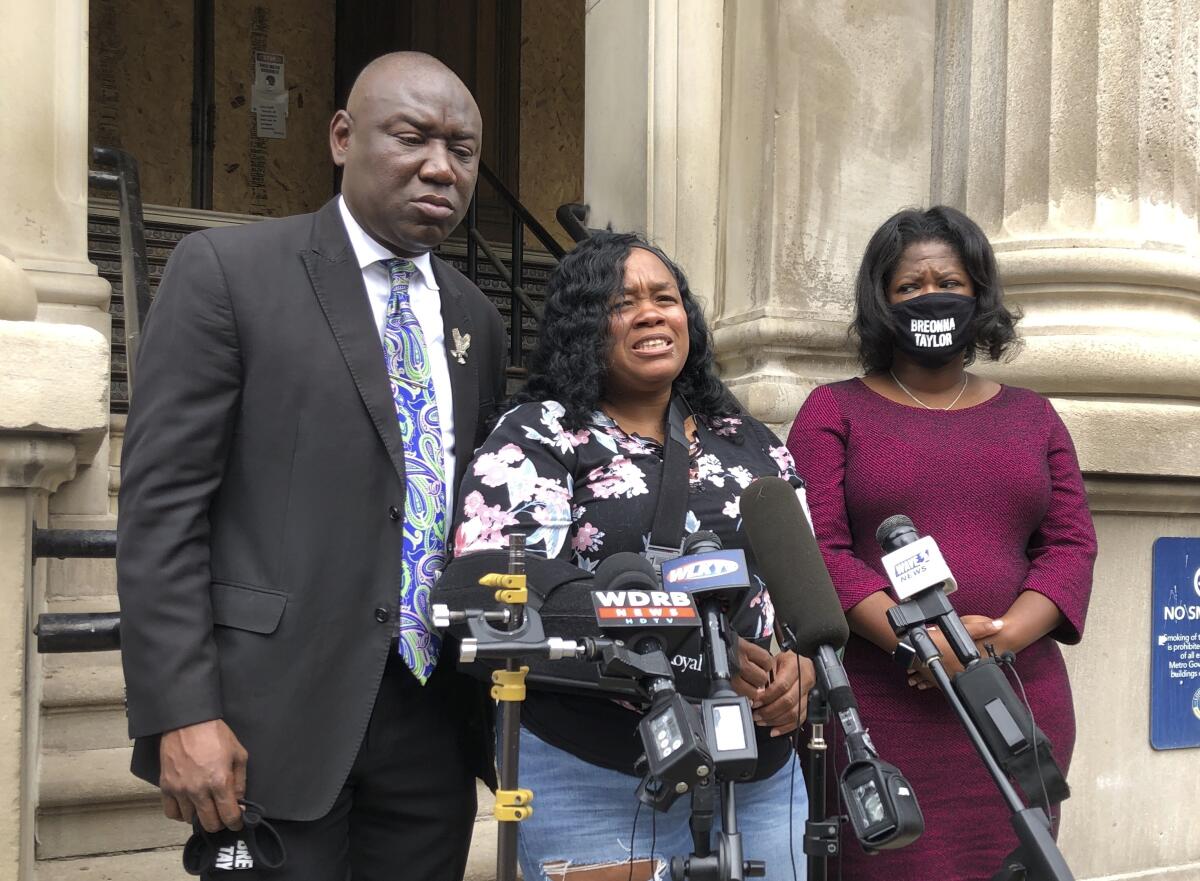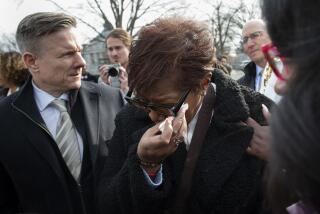Louisville to pay $12 million to Breonna Taylor’s mom and introduce police reforms

- Share via
LOUISVILLE, Ky. — The city of Louisville agreed to pay $12 million to the family of Breonna Taylor and reform police practices as part of a settlement announced Tuesday, months after Taylor’s slaying by police thrust the Black woman’s name to the forefront of a national reckoning on race.
But Taylor’s mother and others who have taken up her cause said more must be done to right the wrongs of racial injustice in America.
“Please continue to say her name,” Taylor’s mother, Tamika Palmer, declared at an emotional news conference, evoking the call that has become a national refrain for those outraged by the shooting and police violence.
Taylor’s death sparked months of protests in Louisville and calls nationwide for the officers to be criminally charged. The state’s attorney general, Daniel Cameron, is investigating police actions in the March 13 fatal shooting.
“I cannot begin to imagine Ms. Palmer’s pain, and I am deeply, deeply sorry for Breonna’s death,” said Louisville Mayor Greg Fischer in announcing the terms of the lawsuit settlement.
Standing nearby as the mayor spoke, Palmer said the police reforms were not enough.
“We must not lose focus on what the real job is, and with that being said, it’s time to move forward with the criminal charges, because she deserves that and much more,” Palmer said. “As significant as today is, it’s only the beginning of getting full justice for Breonna.”
The lawsuit, filed by Palmer in April, accused police of using flawed information when they obtained a “no-knock” warrant to enter the 26-year-old woman’s apartment. Taylor and her boyfriend, Kenneth Walker, were roused from bed by police, and Walker said he fired once at the officers, thinking they were intruders. Investigators say police were returning fire when they shot Taylor several times. No drugs were found at her home.
Dissatisfaction with the settlement extended to “Injustice Square” in downtown Louisville, where demonstrators have gathered daily for 113 days, demanding justice for Taylor. Some who listened to the announcement over a loudspeaker near a memorial for Taylor said the price for a life seemed low, the promised reforms too little and too late.
“It’s just not enough,” said Holly McGlawn, who noted how much Taylor might have made had she lived. She was young; she could have worked for another 40 or 50 years, she said.
“You can’t put a price on a Black woman being able to sleep at night and know she’s not going to get murdered,” McGlawn said.
“Justice delayed is justice denied. There was a better way to handle this,” said Shameka Parrish-Wright who has been part of the daily demonstrations where the city often faced peaceful protesters with force. “I’m hearing apologies now that should have happened early on.”
Palmer left the news conference with one of her attorneys, Ben Crump, and met with protesters at the nearby park. She surveyed the original art of her daughter, prayed and wiped away tears.
She had just two words to say: “Pressure applied,” a saying her daughter often used as an emergency medical tech.
Crump said the $12-million payout is the largest such settlement given out for a Black woman killed by police.
The settlement “sets a precedent for Black people,” he said. “When [police] kill us we expect full justice. We expect justice for the civil rights that you took from this human being. And then we expect full justice from the criminal justice system.”
In the time since Taylor’s shooting, her death — along with George Floyd and others — has become a rallying cry for protesters seeking a reckoning on racial justice and police reform. High-profile celebrities such as Oprah Winfrey and LeBron James have called for the officers to be charged in Taylor’s death.
Palmer’s lawsuit accuses three Louisville police officers of blindly firing into Taylor’s apartment the night of the raid, striking Taylor several times. One of the officers, Jonathan Mattingly, went into the home after the door was broken down and was struck in the leg by the gunshot from Walker.
The warrant was one of five issued in a wide-ranging investigation of a drug trafficking suspect who was a former boyfriend of Taylor’s. That man, Jamarcus Glover, was arrested at a different location about 10 miles away from Taylor’s apartment on the same evening.
The settlement includes reforms on how warrants are handled by police, Fischer said.
Other reforms seek to build stronger community connections by establishing a housing credit program to encourage officers to live in certain low-income areas in the city. Officers will also be encouraged to perform two paid hours of volunteer work every two weeks in the communities where they serve. The city will also track police use-of-force incidents and citizen complaints.
The city has already taken some other reform measures, including passing a law named for Taylor that bans the use of the no-knock warrants. Police typically use them in drug cases over concern that evidence could be destroyed if they announce their arrival.
Fischer fired former Police Chief Steve Conrad in June and last week named Yvette Gentry, a former deputy chief, as the interim police chief. Gentry would be the first Black woman to lead the force of about 1,200 sworn officers. The department has also fired Brett Hankison, one of the three officers who fired shots in Taylor’s apartment that night. Hankison is appealing the dismissal.
The largest settlement previously paid in a misconduct case was $8.5 million in 2012, to a man who spent nine years in prison for a crime he did not commit, according to news reports.
More to Read
Sign up for Essential California
The most important California stories and recommendations in your inbox every morning.
You may occasionally receive promotional content from the Los Angeles Times.










